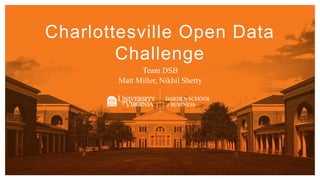2018 Charlottesville Open Data Challenge - Team DSB
- 1. 1 Charlottesville Open Data Challenge Team DSB Matt Miller, Nikhil Shetty
- 2. 2 OBSERVATIONS IN NUMBER OF CLIENTS DATA • High variance from April to June indicate either special events (holiday, festival, event in downtown mall), beautiful weather drawing visitors to the downtown mall, and/or surprise inclement weather forcing visitors indoors and onto Wi-Fi • No observable increasing or decreasing trend in overall time series; the slope of the plotted trendline is not statistically significant Monticello Wine Trail Festival Tom Tom Founder’s Festival Pride Festival
- 3. 3 NUMBER OF CLIENTS & WEATHER DATA • Monthly trend in number of clients reveals correlation with weather data. Number of clients rises and falls with temperature • April-August: High • Sept-Oct : Medium • Nov-Mar: Low • Precipitation, observed at a daily level, does not seem to have a consistent effect on the number of clients. More granular, hourly data may be more predictive • The number of clients is highest in the months of April to August – a time when most UVa students are out of town. Thus, UVa students are not a significant percentage of Wi-Fi clients at the downtown mall
- 4. 4 STRONG WEEKLY SEASONALITY OBSERVED IN THE CLIENTS DATA • Number of clients exhibits strong weekly seasonality – increases steadily through the week starting on Sunday, peaks on Friday and settles down at the end of the week • Fridays are the most popular days on downtown mall, particularly from April to September, during “Fridays After Five”
- 5. 5 SESSIONS DATA CLOSELY FOLLOWS CLIENTS DATA • Number of sessions is highly correlated with number of clients • The histogram of sessions per client follows a near normal distribution indicating there are no additional factors affecting number of sessions beyond those captured in the number of clients Note: The data for number of sessions is missing for the months of Jan and half of Feb. Therefore the # sessions values in Jan & Feb are low.
- 6. 6 OBSERVATIONS IN USAGE DATA • Usage data is inconsistent with clients data. Usage is highest in Oct-Nov while clients are highest in Apr-Aug, indicating that the drivers of usage differ from drivers of clients • No global trend observed in usage data • Downloads are roughly 85% of total data usage, with uploads comprising the remainder. This ratio shifts slightly towards uploads on Friday, Saturday, and Sunday
- 7. 7 NO WEEKLY SEASONALITY IN USAGE • The number of clients is highest on Fridays and Saturdays, but data usage does not peak on those days. Thus, weekend visitors drive up the number of clients but are light consumers of Wi-Fi data • Therefore, clients can be broken down into two segments: • Segment 1 – Weekend visitors, large in number but light users of data • Segment 2 – Likely local residents/businesses, small in number but heavy users of data
- 8. 8 DAILY SEASONALITY IN USAGE DATA Total usage follows a daily seasonality peaking between 10am-6pm EST (9am-5pm with daylight savings) each day. Since these are non-peak hours for visitors, it reinforces the hypothesis that local residents and/or businesses (Segment 2) are the biggest consumers of Wi-Fi data Note: The time on the x-axis is UTC time zone
- 9. 9 PARKING TICKET DATA ACTS AS A PROXY FOR DOWNTOWN MALL ACTIVITY Heatmap of Parking Tickets Issued 2017 • Parking tickets are issued Mon-Fri • Data set is publicly available through City of Charlottesville Open Data Portal 0 50 100 150 200 250 300 350 400 450 500 1 2 3 4 5 6 7 8 9 10 11 12 13 14 15 16 17 18 19 20 Parking Tickets by Hour of Day and Day of Week Mon Tue Wed Thu Fri
- 10. 10 COMPARISON OF WEEKLY SEASONALITY IS INCONCLUSIVE On a daily level, parking tickets track more closely with data usage than with sessions or clients, but still the relationship is weak Note: Weekends excluded because very few parking tickets are issued on weekends - 0.5 1.0 1.5 2.0 2.5 3.0 3.5 4.0 4.5 0 20 40 60 80 100 120 140 160 180 Mon Tue Wed Thu Fri DataUsage(MB) Tickets,Clients,Sessions Average Parking Tickets Verses Wi-Fi Clients, Sessions, and Usage Tickets Clients Sessions (x10^-1) Data Usage
- 11. 11 PARKING TICKETS SHOW A MEANINGFUL CORRELATION TO DATA USAGE AT 4-HOUR GRANULARITY Note: Weekends excluded because very few parking tickets are issued on weekends y = 9982.5x + 533600 R² = 0.0297 - 1,000,000 2,000,000 3,000,000 4,000,000 5,000,000 6,000,000 7,000,000 0 20 40 60 80 100 DataUsage(B) Parking Tickets 4-Hour Data Usage vs Parking Tickets y = 0.3945x + 11.469 R² = 0.0362 0 2 4 6 8 10 12 14 16 18 0 1 2 3 4 5 LN(DataUsage) LN(Parking Tickets + 1) Log-Log Transform 4-Hour Data Usage vs Parking Tickets • Parking tickets partially explain visitors to the downtown mall, and therefore data usage • If client and session data were available with 4-hour granularity, we could more rigorously test this claim and tease out the relationship between tickets and data usage versus tickets and clients
- 12. 12
- 13. 13 NO OBSERVED SEASONALITY IN CLIENTS ACROSS DAYS OF MONTH
- 14. 14 BREAK-UP OF USAGE DATA














